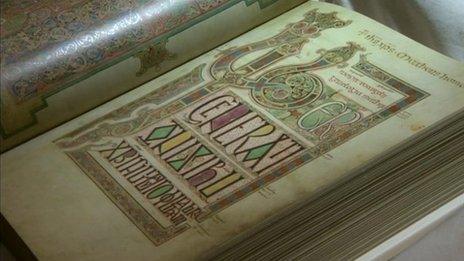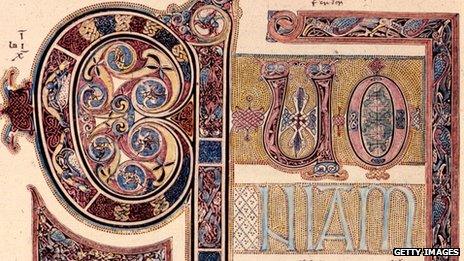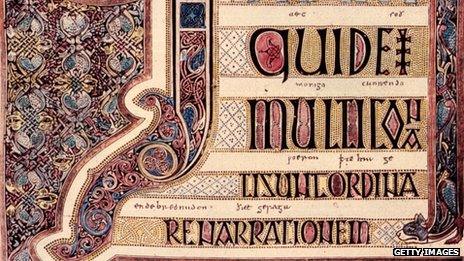Lindisfarne Gospels: Should Durham or London have them?
- Published

Written in AD 715, the Gospels were created in honour of St Cuthbert

The 1,300-year-old Lindisfarne Gospels are in almost perfect condition

The Gospels were carried 1,000 miles around the North East for 200 years
After years of negotiation the Lindisfarne Gospels are being exhibited in Durham, on loan from the British Library in London.
The 1,300-year-old manuscript last visited the north-east of England in 2000 and the campaign to keep it is as strong as ever.
But not everyone thinks the region is the best place to house the precious book permanently.
Written by Eadfrith, Bishop of Lindisfarne in honour of St Cuthbert, it contains the oldest surviving translation of the Gospels into the English language.
It is part of a research collection of more than 150 million items which the British Library has always maintained should be in the same, easily accessible place.
Perhaps surprisingly, considering the effort it took to get it to Durham at all, the exhibition's programme director Keith Bartlett also believes it should not stay for ever.
It is "part of our national collection", he says, and should live "alongside other fabulous works" in the British Library where the greatest number of people can access it in context.
The Northumbrian Association does not agree and has been campaigning for a permanent return for 14 years.
'Means something'
Its historian Chris Kilkenny is hoping enough people will visit between 1 July and 30 September to force the British Library to "reconsider their position" and agree to a regional outpost in Durham.
"I don't believe in this idea that everything has to be in London. I think we're more than capable of looking after it and displaying it," he said.
"Here it means something. In a museum on the Euston Road it doesn't mean so much."
He also discounts the idea that Durham cannot afford the security and specialised conditions necessary to keep the gospels permanently.
"I think you'll find the British taxpayer pays for them being kept at the British Library and I think the British taxpayer would be more than pleased to pay the same amount for them to be stored in Durham."
Durham Labour MP Roberta Blackman-Woods, one of a number of MPs campaigning for the manuscript to live in the North East, secured a debate in Parliament in June to discuss its importance.
"The Gospels are of huge cultural significance to the region and we have the capacity and skills to look after them," she said.
But Durham University vice-chancellor Chris Higgins is adamant that such a move is "never going to happen".
"Why should it be in the North East permanently? It's a national treasure not a North East treasure," he said.
In the past, relations with the British Library have been strained by the campaign to keep the Gospels in the region.
The university has had to work hard to "show professionalism and competence" and prove it can be trusted with them, Prof Higgins said.
'Literally thousands'
British Library head of history and classics, Dr Scot McKendrick, said: "The library recognises the significance of the Lindisfarne Gospels for the North East but it also recognises that the Lindisfarne Gospels play a very important part in the national collection.

"People from all over the world come to see them - literally thousands of people a day at the British Library.
"To curate, to steward an object of this nature takes a huge amount of resource."
But campaigner Mr Kilkenny is weary of what he calls the British Library's "procrastinations".
"They used to say scholars can only come to London to see these things but, after all, we invented the railways so they can get up to Durham quite easily and we invented the electric light so they can see the things when they got here," he said.
The exhibition at Durham University opens to the public on 1 July and lasts for three months.
- Published22 April 2013
- Published20 March 2013
- Published2 July 2012